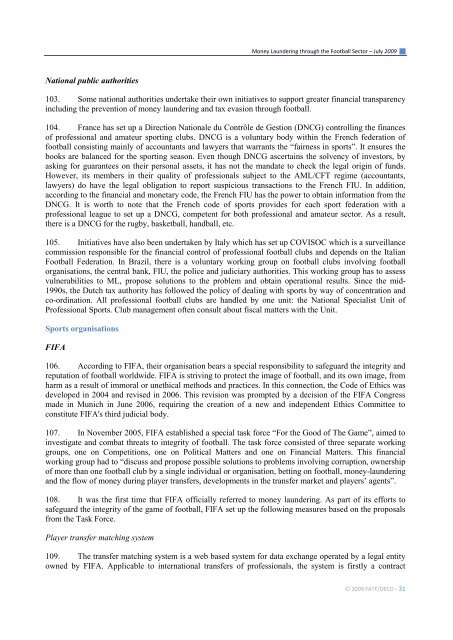Money Laundering through the Football Sector
Money Laundering through the Football Sector
Money Laundering through the Football Sector
Create successful ePaper yourself
Turn your PDF publications into a flip-book with our unique Google optimized e-Paper software.
National public authorities<br />
<strong>Money</strong> <strong>Laundering</strong> <strong>through</strong> <strong>the</strong> <strong>Football</strong> <strong>Sector</strong> – July 2009 <br />
103. Some national authorities undertake <strong>the</strong>ir own initiatives to support greater financial transparency<br />
including <strong>the</strong> prevention of money laundering and tax evasion <strong>through</strong> football.<br />
104. France has set up a Direction Nationale du Contrôle de Gestion (DNCG) controlling <strong>the</strong> finances<br />
of professional and amateur sporting clubs. DNCG is a voluntary body within <strong>the</strong> French federation of<br />
football consisting mainly of accountants and lawyers that warrants <strong>the</strong> “fairness in sports”. It ensures <strong>the</strong><br />
books are balanced for <strong>the</strong> sporting season. Even though DNCG ascertains <strong>the</strong> solvency of investors, by<br />
asking for guarantees on <strong>the</strong>ir personal assets, it has not <strong>the</strong> mandate to check <strong>the</strong> legal origin of funds.<br />
However, its members in <strong>the</strong>ir quality of professionals subject to <strong>the</strong> AML/CFT regime (accountants,<br />
lawyers) do have <strong>the</strong> legal obligation to report suspicious transactions to <strong>the</strong> French FIU. In addition,<br />
according to <strong>the</strong> financial and monetary code, <strong>the</strong> French FIU has <strong>the</strong> power to obtain information from <strong>the</strong><br />
DNCG. It is worth to note that <strong>the</strong> French code of sports provides for each sport federation with a<br />
professional league to set up a DNCG, competent for both professional and amateur sector. As a result,<br />
<strong>the</strong>re is a DNCG for <strong>the</strong> rugby, basketball, handball, etc.<br />
105. Initiatives have also been undertaken by Italy which has set up COVISOC which is a surveillance<br />
commission responsible for <strong>the</strong> financial control of professional football clubs and depends on <strong>the</strong> Italian<br />
<strong>Football</strong> Federation. In Brazil, <strong>the</strong>re is a voluntary working group on football clubs involving football<br />
organisations, <strong>the</strong> central bank, FIU, <strong>the</strong> police and judiciary authorities. This working group has to assess<br />
vulnerabilities to ML, propose solutions to <strong>the</strong> problem and obtain operational results. Since <strong>the</strong> mid-<br />
1990s, <strong>the</strong> Dutch tax authority has followed <strong>the</strong> policy of dealing with sports by way of concentration and<br />
co-ordination. All professional football clubs are handled by one unit: <strong>the</strong> National Specialist Unit of<br />
Professional Sports. Club management often consult about fiscal matters with <strong>the</strong> Unit.<br />
Sports organisations<br />
FIFA<br />
106. According to FIFA, <strong>the</strong>ir organisation bears a special responsibility to safeguard <strong>the</strong> integrity and<br />
reputation of football worldwide. FIFA is striving to protect <strong>the</strong> image of football, and its own image, from<br />
harm as a result of immoral or unethical methods and practices. In this connection, <strong>the</strong> Code of Ethics was<br />
developed in 2004 and revised in 2006. This revision was prompted by a decision of <strong>the</strong> FIFA Congress<br />
made in Munich in June 2006, requiring <strong>the</strong> creation of a new and independent Ethics Committee to<br />
constitute FIFA's third judicial body.<br />
107. In November 2005, FIFA established a special task force “For <strong>the</strong> Good of The Game”, aimed to<br />
investigate and combat threats to integrity of football. The task force consisted of three separate working<br />
groups, one on Competitions, one on Political Matters and one on Financial Matters. This financial<br />
working group had to “discuss and propose possible solutions to problems involving corruption, ownership<br />
of more than one football club by a single individual or organisation, betting on football, money-laundering<br />
and <strong>the</strong> flow of money during player transfers, developments in <strong>the</strong> transfer market and players‟ agents”.<br />
108. It was <strong>the</strong> first time that FIFA officially referred to money laundering. As part of its efforts to<br />
safeguard <strong>the</strong> integrity of <strong>the</strong> game of football, FIFA set up <strong>the</strong> following measures based on <strong>the</strong> proposals<br />
from <strong>the</strong> Task Force.<br />
Player transfer matching system<br />
109. The transfer matching system is a web based system for data exchange operated by a legal entity<br />
owned by FIFA. Applicable to international transfers of professionals, <strong>the</strong> system is firstly a contract<br />
© 2009 FATF/OECD - 31


